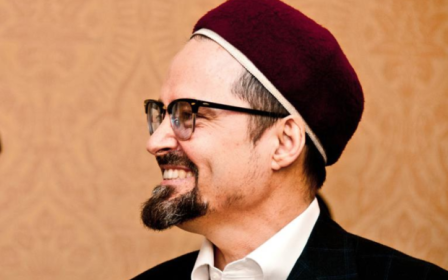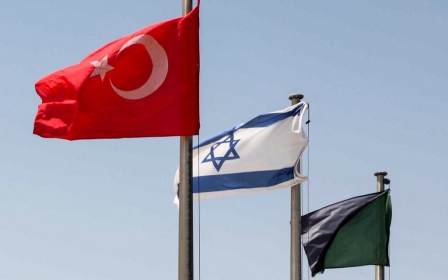Influential Muslim scholar receives award from Jewish organisation promoting Israel normalisation

The American Jewish Committee (AJC) presented its Human Dignity Award to Saudi-based Sheikh Abdullah Bin Bayyah on Wednesday at a ceremony in New York City.
Bin Bayyah is widely recognised as an important scholar in Islamic jurisprudence. He has led the Forum for Promoting Peace in Muslim Societies, is the president of the Abu Dhabi Forum for Peace, and is the chair of the Islamic Law Council of the United Arab Emirates.
The AJC is a Zionist organisation that says “calling for the elimination of the Jewish state, or suggesting that the Jews alone do not have the right to self-determination, is antisemitic”.
According to AJC, the award was presented to him, and “For the occasion, AJC translated into Hebrew and distributed the Charter of the New Alliance of Virtue to thousands of rabbis and other Jewish community leaders in Israel and around the world”.
The Charter asserts that an "alliance among people of all faiths, each drawing upon his or her respective tradition to elevate the virtues conducive to respect, tolerance, and peace, can help extinguish the flames of war and defeat the agents of terror and conflict."
New MEE newsletter: Jerusalem Dispatch
Sign up to get the latest insights and analysis on Israel-Palestine, alongside Turkey Unpacked and other MEE newsletters
The Alliance of Virtue is an effort across "religions to enable their members to live side-by-side in peace and happiness", its website states. It promotes normalisation between Israel and Arab states and began with a multifaith gathering with leaders in Abrahamic faith communities that was convened by Bin Bayyah.
In 2015, Bin Bayyah characterised the power struggle between Saudi Arabia and Iran for regional supremacy, as well as the seven-decade-long Israeli occupation of Palestine, as historical disputes.
"The Shia and the Sunni, it's a problem that arose 1,400 years ago, and the Jews and the Arabs in Palestine and Israel is 2,000 years old," Bin Bayyah said.
Atika, who wished not to use her last name, is doing her master's degree in Palestine Studies. She says that accepting such awards by organisations such as AJC sends a wrong message.
"Getting an award by a known Zionist organisation is nothing to be proud of. Nor is promoting normalisation with Israel, but that's a whole other story," she told Middle East Eye.
In a few days, Abdullah Bin Bayyah is set to win another award from AJC (American Jewish Committee).
— abul ma’ali (@abulmaali_) September 19, 2023
AJC is an extremist Zionist organization that essentially considers all criticism of Israel to be criminal antisemitism.
This won’t be the first time they’re rewarding him. pic.twitter.com/NYUparlc01
"Abdullah bin Bayyah is knowledgeable in Islam. I think we can all acknowledge that. But he should know better than to accept this award, especially knowing the atrocities Israel has committed and continues to commit," Atika added.
Bin Bayyah also played a significant role in the life of Hamza Yusuf, a prominent Muslim scholar based in the US.
In 2020, Yusuf received a wave of criticism for publicly supporting the United Arab Emirates' choice to establish relations with Israel, a decision that was widely criticised by many Muslim religious authorities.
The Forum for Promoting Peace in Muslim Societies, which Yusuf serves on, issued a since-deleted statement claiming normalisation “stopped Israel from extending its sovereignty over Palestinian lands” and was a means to “promote peace and stability across the world”.
Yusuf later said he did “not engage in or endorse geopolitical strategies or treaties”. “My allegiance is and has always been with the oppressed peoples of Palestine, whether Muslim, Christian, or otherwise,” Yusuf said in a statement on Facebook.
Middle East Eye delivers independent and unrivalled coverage and analysis of the Middle East, North Africa and beyond. To learn more about republishing this content and the associated fees, please fill out this form. More about MEE can be found here.





